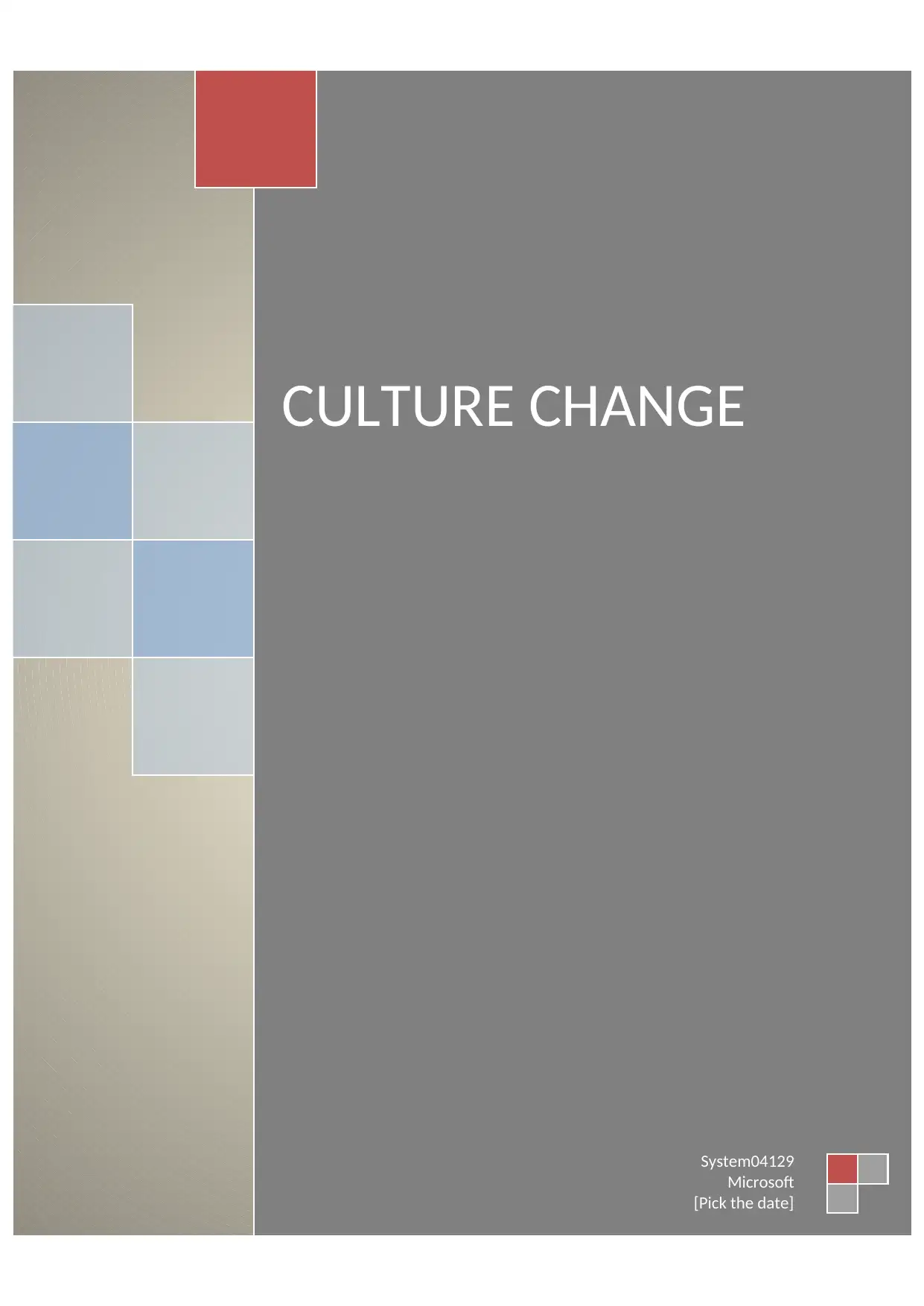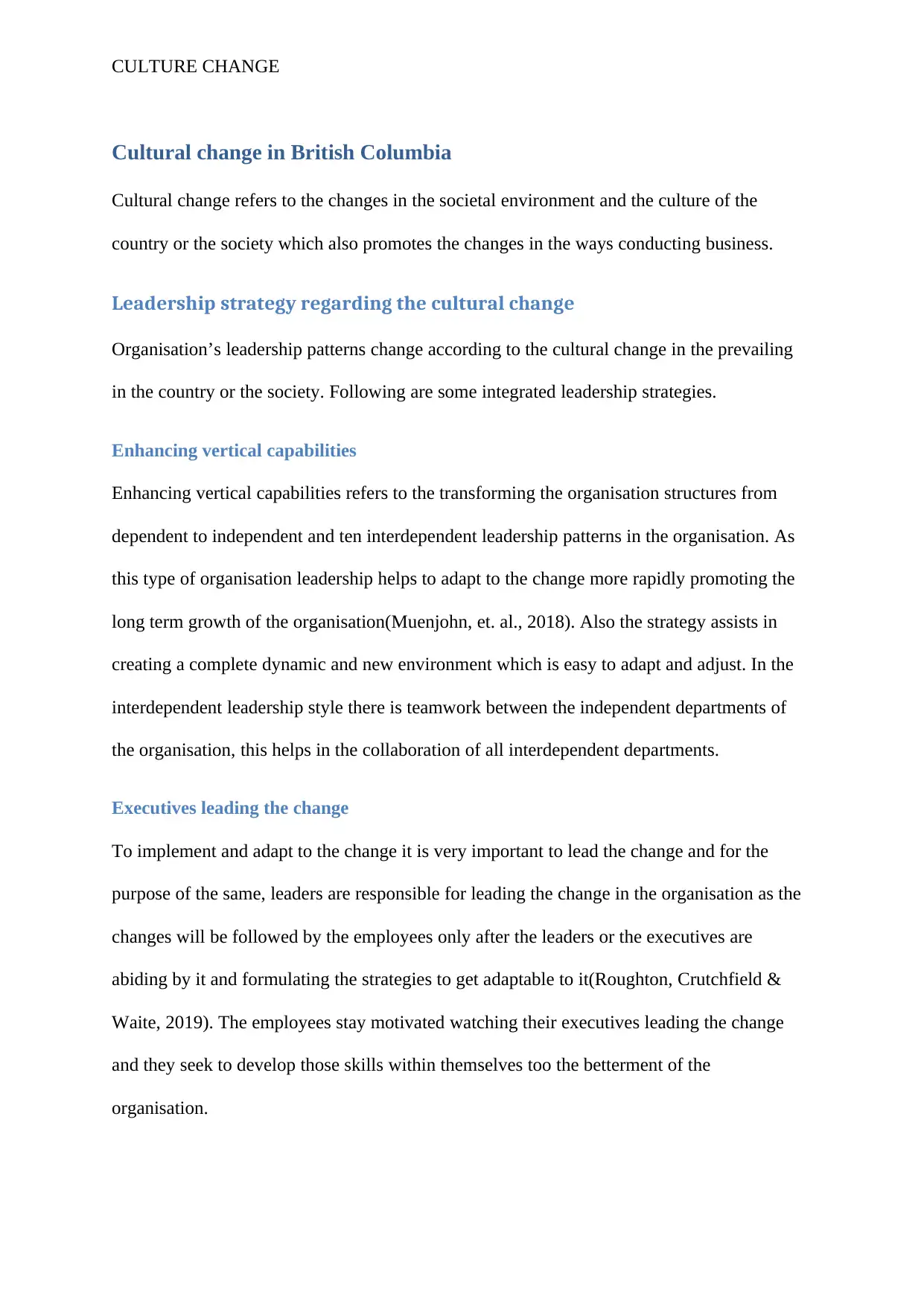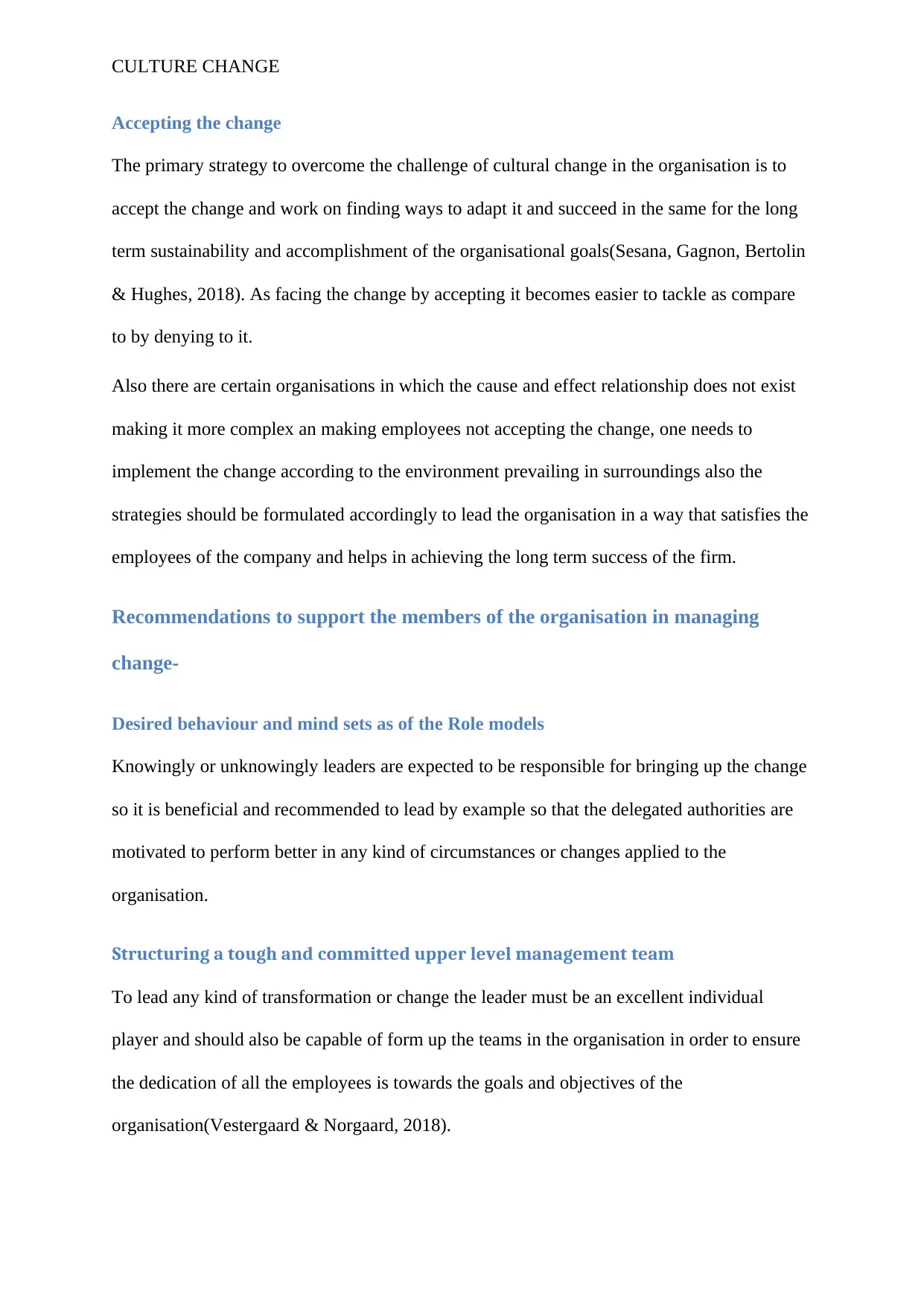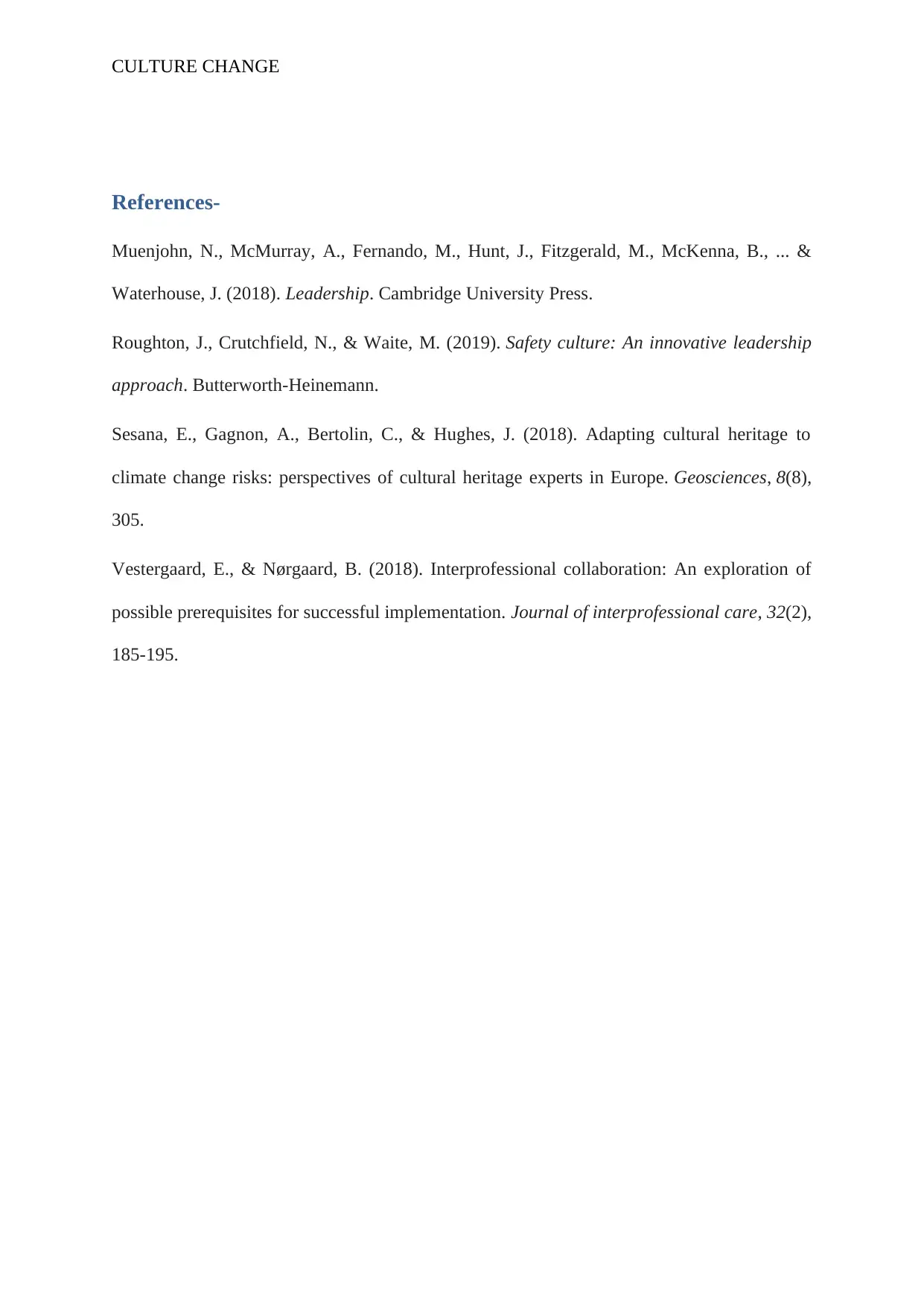Leadership Strategy for Culture Change in BC Public Service
VerifiedAdded on 2022/11/17
|4
|726
|332
Report
AI Summary
This report addresses the leadership challenge of culture change within the British Columbia public service. It proposes integrated leadership strategies, focusing on enhancing vertical capabilities and the role of executives in leading change. The report emphasizes the importance of accepting change and formulating strategies that consider the organizational environment. Recommendations include leading by example and forming a strong upper-level management team to support employees in managing change. The report also addresses homeostasis through polarity management using internal communication to engage and empower employees, with an analysis of current communication practices. References to relevant literature support the proposed strategies.

CULTURE CHANGE
System04129
Microsoft
[Pick the date]
System04129
Microsoft
[Pick the date]
Paraphrase This Document
Need a fresh take? Get an instant paraphrase of this document with our AI Paraphraser

CULTURE CHANGE
Cultural change in British Columbia
Cultural change refers to the changes in the societal environment and the culture of the
country or the society which also promotes the changes in the ways conducting business.
Leadership strategy regarding the cultural change
Organisation’s leadership patterns change according to the cultural change in the prevailing
in the country or the society. Following are some integrated leadership strategies.
Enhancing vertical capabilities
Enhancing vertical capabilities refers to the transforming the organisation structures from
dependent to independent and ten interdependent leadership patterns in the organisation. As
this type of organisation leadership helps to adapt to the change more rapidly promoting the
long term growth of the organisation(Muenjohn, et. al., 2018). Also the strategy assists in
creating a complete dynamic and new environment which is easy to adapt and adjust. In the
interdependent leadership style there is teamwork between the independent departments of
the organisation, this helps in the collaboration of all interdependent departments.
Executives leading the change
To implement and adapt to the change it is very important to lead the change and for the
purpose of the same, leaders are responsible for leading the change in the organisation as the
changes will be followed by the employees only after the leaders or the executives are
abiding by it and formulating the strategies to get adaptable to it(Roughton, Crutchfield &
Waite, 2019). The employees stay motivated watching their executives leading the change
and they seek to develop those skills within themselves too the betterment of the
organisation.
Cultural change in British Columbia
Cultural change refers to the changes in the societal environment and the culture of the
country or the society which also promotes the changes in the ways conducting business.
Leadership strategy regarding the cultural change
Organisation’s leadership patterns change according to the cultural change in the prevailing
in the country or the society. Following are some integrated leadership strategies.
Enhancing vertical capabilities
Enhancing vertical capabilities refers to the transforming the organisation structures from
dependent to independent and ten interdependent leadership patterns in the organisation. As
this type of organisation leadership helps to adapt to the change more rapidly promoting the
long term growth of the organisation(Muenjohn, et. al., 2018). Also the strategy assists in
creating a complete dynamic and new environment which is easy to adapt and adjust. In the
interdependent leadership style there is teamwork between the independent departments of
the organisation, this helps in the collaboration of all interdependent departments.
Executives leading the change
To implement and adapt to the change it is very important to lead the change and for the
purpose of the same, leaders are responsible for leading the change in the organisation as the
changes will be followed by the employees only after the leaders or the executives are
abiding by it and formulating the strategies to get adaptable to it(Roughton, Crutchfield &
Waite, 2019). The employees stay motivated watching their executives leading the change
and they seek to develop those skills within themselves too the betterment of the
organisation.

CULTURE CHANGE
Accepting the change
The primary strategy to overcome the challenge of cultural change in the organisation is to
accept the change and work on finding ways to adapt it and succeed in the same for the long
term sustainability and accomplishment of the organisational goals(Sesana, Gagnon, Bertolin
& Hughes, 2018). As facing the change by accepting it becomes easier to tackle as compare
to by denying to it.
Also there are certain organisations in which the cause and effect relationship does not exist
making it more complex an making employees not accepting the change, one needs to
implement the change according to the environment prevailing in surroundings also the
strategies should be formulated accordingly to lead the organisation in a way that satisfies the
employees of the company and helps in achieving the long term success of the firm.
Recommendations to support the members of the organisation in managing
change-
Desired behaviour and mind sets as of the Role models
Knowingly or unknowingly leaders are expected to be responsible for bringing up the change
so it is beneficial and recommended to lead by example so that the delegated authorities are
motivated to perform better in any kind of circumstances or changes applied to the
organisation.
Structuring a tough and committed upper level management team
To lead any kind of transformation or change the leader must be an excellent individual
player and should also be capable of form up the teams in the organisation in order to ensure
the dedication of all the employees is towards the goals and objectives of the
organisation(Vestergaard & Norgaard, 2018).
Accepting the change
The primary strategy to overcome the challenge of cultural change in the organisation is to
accept the change and work on finding ways to adapt it and succeed in the same for the long
term sustainability and accomplishment of the organisational goals(Sesana, Gagnon, Bertolin
& Hughes, 2018). As facing the change by accepting it becomes easier to tackle as compare
to by denying to it.
Also there are certain organisations in which the cause and effect relationship does not exist
making it more complex an making employees not accepting the change, one needs to
implement the change according to the environment prevailing in surroundings also the
strategies should be formulated accordingly to lead the organisation in a way that satisfies the
employees of the company and helps in achieving the long term success of the firm.
Recommendations to support the members of the organisation in managing
change-
Desired behaviour and mind sets as of the Role models
Knowingly or unknowingly leaders are expected to be responsible for bringing up the change
so it is beneficial and recommended to lead by example so that the delegated authorities are
motivated to perform better in any kind of circumstances or changes applied to the
organisation.
Structuring a tough and committed upper level management team
To lead any kind of transformation or change the leader must be an excellent individual
player and should also be capable of form up the teams in the organisation in order to ensure
the dedication of all the employees is towards the goals and objectives of the
organisation(Vestergaard & Norgaard, 2018).
⊘ This is a preview!⊘
Do you want full access?
Subscribe today to unlock all pages.

Trusted by 1+ million students worldwide

CULTURE CHANGE
References-
Muenjohn, N., McMurray, A., Fernando, M., Hunt, J., Fitzgerald, M., McKenna, B., ... &
Waterhouse, J. (2018). Leadership. Cambridge University Press.
Roughton, J., Crutchfield, N., & Waite, M. (2019). Safety culture: An innovative leadership
approach. Butterworth-Heinemann.
Sesana, E., Gagnon, A., Bertolin, C., & Hughes, J. (2018). Adapting cultural heritage to
climate change risks: perspectives of cultural heritage experts in Europe. Geosciences, 8(8),
305.
Vestergaard, E., & Nørgaard, B. (2018). Interprofessional collaboration: An exploration of
possible prerequisites for successful implementation. Journal of interprofessional care, 32(2),
185-195.
References-
Muenjohn, N., McMurray, A., Fernando, M., Hunt, J., Fitzgerald, M., McKenna, B., ... &
Waterhouse, J. (2018). Leadership. Cambridge University Press.
Roughton, J., Crutchfield, N., & Waite, M. (2019). Safety culture: An innovative leadership
approach. Butterworth-Heinemann.
Sesana, E., Gagnon, A., Bertolin, C., & Hughes, J. (2018). Adapting cultural heritage to
climate change risks: perspectives of cultural heritage experts in Europe. Geosciences, 8(8),
305.
Vestergaard, E., & Nørgaard, B. (2018). Interprofessional collaboration: An exploration of
possible prerequisites for successful implementation. Journal of interprofessional care, 32(2),
185-195.
1 out of 4
Related Documents
Your All-in-One AI-Powered Toolkit for Academic Success.
+13062052269
info@desklib.com
Available 24*7 on WhatsApp / Email
![[object Object]](/_next/static/media/star-bottom.7253800d.svg)
Unlock your academic potential
Copyright © 2020–2026 A2Z Services. All Rights Reserved. Developed and managed by ZUCOL.





